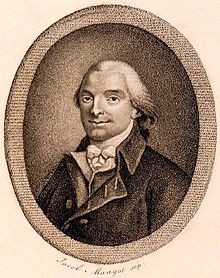- Jean-Pierre Claris de Florian
-
Jean-Pierre Claris de Florian (March 6, 1755 château of Florian, near Sauve, Gard – September 13, 1794) was a French poet and romance writer.
Contents
Life
His mother, a Spanish lady named Gilette de Salgues, died when he was a child. He was brought up by his grandfather and studied at St. Hippolyte. His uncle and guardian, the Marquis of Florian, who had married a niece of Voltaire, introduced him at the château de Ferney and in 1768 he became page at Anet in the household of the Duc de Penthièvre, who remained his friend throughout his life. Having studied for some time at the artillery school at Bapaume he obtained from his patron a captain's commission in the dragoon regiment of Penthièvre.
He left the army soon after and began to write comedies, and was elected to the Académie Française in 1788. On the outbreak of the French Revolution he retired to Sceaux, but he was soon discovered and imprisoned; and though Robespierre's death spared him, he died a few months later still in prison.[1]
Works
To modern readers, Florian is chiefly known as the author of pretty fables well suited as reading for the young, but his contemporaries praised him also for his poetical and pastoral novels. Florian was very fond of Spain and its literature, doubtless owing to the influence of his Castilian mother, and both abridged and imitated the works of Cervantes.
Florian's first literary efforts were comedies; his verse epistle Voltaire et le serf du Mont Jura and an eclogue Ruth were crowned by the French Academy in 1782 and 1784 respectively. In 1782 also he produced a one-act prose comedy, Le Bon Ménage, and in the next year Galatie, a romantic tale in imitation of the Galatea of Cervantes. Other short tales and comedies followed, and in 1786 appeared Numa Pompilius, an undisguised imitation of Fénelon's Telémaque.
In 1788 he became a member of the French Academy, and published Estelle, a pastoral of the same class as Galatie. Another romance, Gonzalve de Cordoue, preceded by an historical notice of the Moors, appeared in 1791, and his famous collection of Fables in 1802. Among his posthumous works are La Jeunesse de Florian, ou Mémoires d'un Jeune Espagnol (1807), and an abridgment (1809) of Don Quixote, which, though far from being a correct representation of the original, had great and merited success.
Florian imitated Salomon Gessner, the Swiss idyllist, and his style has all the artificial delicacy and sentimentality of the Gessnerian school. Perhaps the nearest example of the class in English literature is afforded by John Wilson's Lights and Shadows of Scottish Life (written as Christopher North). Among the best of his fables are reckoned The Monkey showing the Magic Lantern, The Blind Man and the Paralytic, and The Monkeys and the Leopard.
Selected works
- Fables[2]
- The Blind man and the Paralytic
- The Monkey and the Magic Lantern
- The Monkeys and the Leopard
- The Fable and the Truth
- The Crocodile and the Sturgeon'
- The Child and the Mirror
- The Old Tree and the Gardener
- The Nightingale and the Prince
- The Two Travelers
- Theatre
- Les Deux Billets (1779)
- Le Bon Ménage (1782)
- Le Bon Père (1784)
- Les Jumeaux de Bergame (1782)
- Other
- Pastorales
- Variétés et contes en vers
- Plaisir d'amour, a song
- Mémoires d'un jeune Espagnol
Famous verses
Florian wrote a collection of fables. From these fables several expressions have passed into colloquial French:
- Pour vivre heureux, vivons cachés: "In order to live happily, live hidden"
- Chacun son métier, les vaches seront bien gardées: "To each his occupation, and the cows will be well guarded."
- Rira bien qui rira le dernier: "He who laughs last laughs best."
The expression éclairer la lanterne ("light the lantern") is also drawn from Florian's fables.
Bibliography
 This article incorporates text from a publication now in the public domain: Chisholm, Hugh, ed (1911). Encyclopædia Britannica (11th ed.). Cambridge University Press.
This article incorporates text from a publication now in the public domain: Chisholm, Hugh, ed (1911). Encyclopædia Britannica (11th ed.). Cambridge University Press. This article incorporates text from a publication now in the public domain: Herbermann, Charles, ed (1913). Catholic Encyclopedia. Robert Appleton Company.
This article incorporates text from a publication now in the public domain: Herbermann, Charles, ed (1913). Catholic Encyclopedia. Robert Appleton Company.- Florian, Fables, edited by Jean-Noël Pascal, Ferney-Voltaire, Centre international d'étude du XVIIIe siècle, 2005, ISBN 2-84559-032-6
- Florian le fabuliste by Jean-Luc Gourdin, biography, Ramsay, 2003.
- Florian, l'homme à fables, illustrated by Jean-François Ramirez, collection of 40 fables selected by Florian Mantione, 1997, Edition Athéna-Paris
See also
Notes
- ^ His death certificate, dated 27 fructidor, year II, is available online at Archives municipales de Sceaux
- ^ The entire set of his fables can be found at Jean-Pierre Claris de Florian et les fables, Shanaweb.net
External links
- Complete works for Theatre on the site CÉSAR
- The Text of Théatre Italien vol.2
- The 1895 illustrated Japanese edition of the first volume of the Fables
- Official page at the Académie Française
Académie Française Seat 29 Pierre Bardin (1634) · Nicholas Bourbon (1637) · François-Henri Salomon de Virelade (1644) · Philippe Quinault (1670) · François de Callières (1688) · André-Hercule de Fleury (1717) · Paul d'Albert de Luynes (1743) · Jean-Pierre Claris de Florian (1788) · Jean-François Cailhava de L'Estandoux (1803) · Joseph François Michaud (1813) · Jean Pierre Flourens (1840) · Claude Bernard (1868) · Ernest Renan (1878) · Paul-Armand Challemel-Lacour (1893) · Gabriel Hanotaux (1897) · André Siegfried (1944) · Henry de Montherlant (1960) · Claude Lévi-Strauss (1973) · Amin Maalouf (2011)
Categories:- 1755 births
- 1794 deaths
- People from Gard
- French poets
- Spanish–French translators
- French people of Spanish descent
- Members of the Académie française
Wikimedia Foundation. 2010.

